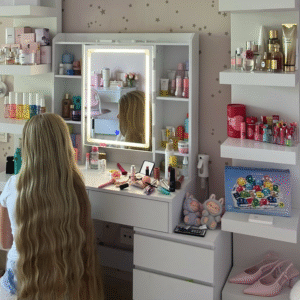16-year-old Irma shares how Gen Z can help address Gen Alpha’s beauty enthusiasm

Gen Alpha have been nicknamed “Sephora Kids” for their interest in luxury beauty products.
Picture by: Irma Mecele
Article link copied.
October 3, 2025
Why we must stop Gen Alpha’s obsession with beauty products

The first time I realised how powerful beauty marketing has become was when I walked into my sister’s room. Barely 11, she had shelves filled with serums and make-up products that I don’t even use at 16.
The perfectly arranged bottles, in every shape, size and colour, looked like they belonged in a cosmetics store. There she was, in front of her vanity mirror, filming a short clip of herself putting on make-up.
Harbingers’ Weekly Brief
She is not alone. Gen Alpha, born between 2010 and 2024, are now being labelled as the “Sephora Kids” across social media. They are adopting multi-step skincare routines, own luxury make-up products and spend hours in beauty stores. After shopping, they film what they bought and show off the overly expensive containers in front of the camera to later post online.
But this is not harmless fun. They are absorbing beauty standards that are unrealistic, unattainable and even non-human. In addition, these trends leave friends and classmates feeling excluded if they don’t have the same products. Make-up is becoming a form of social status among children.
Every generation has gone through its own phase of beauty standards. Millennials (1981–1996) emphasisedsharp features through heavy contouring, bold lips and arched eyebrows. Gen Z (1997–2009) focusedmore on inclusivity, body positivity and natural beauty.
The difference with Gen Alpha is the speed at which these trends spread. With social media platforms and algorithms designed to hook younger audiences, beauty ideals now reach children instantly.
The power of marketing
Marketing is highly manipulative when it comes to persuading children to buy products. Pre-teens still don’t have strong critical thinking skills, so when someone in authority claims that a product is amazing, they won’t think twice before buying it.
They are also more emotionally impulsive and very influenced by social comparison. If they see their friends buying the products, they feel the pressure to do the same. The colourful, candy-like packaging and sweet scents only make these items more tempting.
Some brands have nearly doubled in size and revenue. Companies capitalise on the fact that 90% of girls follow at least one social media account that makes them feel less beautiful. In total, it is estimated that in the US Gen Alpha and teens spend around $4.7bn on beauty products.
My sister is one of those who fell into the “Sephora trap”. I warned my mother that these products could ruin and damage her youthful skin, but she told me she wanted to let my sister express herself.
The truth is these products are not toys, although they are marketed as if they were. Many contain ingredients designed for adults (such as exfoliating acids) and could provoke allergies or eczema in younger consumers. The bigger issue lies with corporations that design and present them as pre-teen-friendly.
Physical and mental risks
These products carry not only physical risks but huge mental ones too. Many girls feel self-conscious and embarrassed to be seen without make-up. A 2024 survey by Sky News revealed that 21% of girls aged 11 to 16 use anti-ageing products because they worry about fine lines and wrinkles, showing an early rise in “social appearance anxiety”.
To be clear, I am not against wanting to feel clean or doing harmless things such as putting on lip gloss. What I am against is 11-year-olds using retinol and other expensive, sometimes dangerous creams, and feeling ugly if they leave the house without make-up.
While parents hold some responsibility, it is not only on them. Companies must do better at labelling and creating safe, age-appropriate products. Meanwhile, the burden falls on us, older siblings, relatives and friends, to protect the children around us.
As Gen Z, we know the traps of social media and how manipulative marketing can be. We must warn families, share the risks and remind children that beauty products are chemicals, not toys.
At the end of the day, Gen Alpha does not need to drown themselves in products. They need to regain their confidence and develop healthy habits with beauty and make-up.
Written by:

Writer
Vilnius, Lithuania
Born in 2009 in London, UK, Irma studies in Vilnius, Lithuania. She is interested in history, politics and the environment, and plans to study economics. For Harbingers’ Magazine, she writes about politics, culture and society.
In her free time, Irma plays tennis, piano and other sports like karate and boxing. She also enjoys learning languages, travelling and singing. She is proud of finishing a Columbia University program, completing an internship at the EU and taking part in the ‘Voice Kids of Spain’.
Irma speaks Russian, English, Spanish and studies French and Lithuanian.
Edited by:

🌍 Join the World's Youngest Newsroom—Create a Free Account
Sign up to save your favourite articles, get personalised recommendations, and stay informed about stories that Gen Z worldwide actually care about. Plus, subscribe to our newsletter for the latest stories delivered straight to your inbox. 📲
© 2025 The Oxford School for the Future of Journalism


